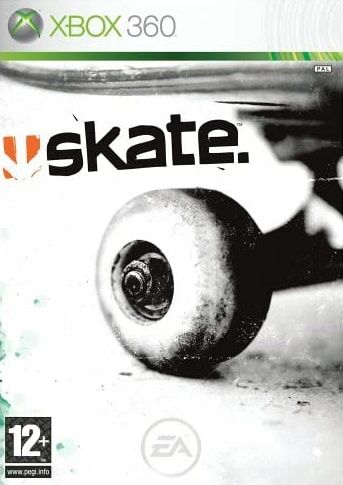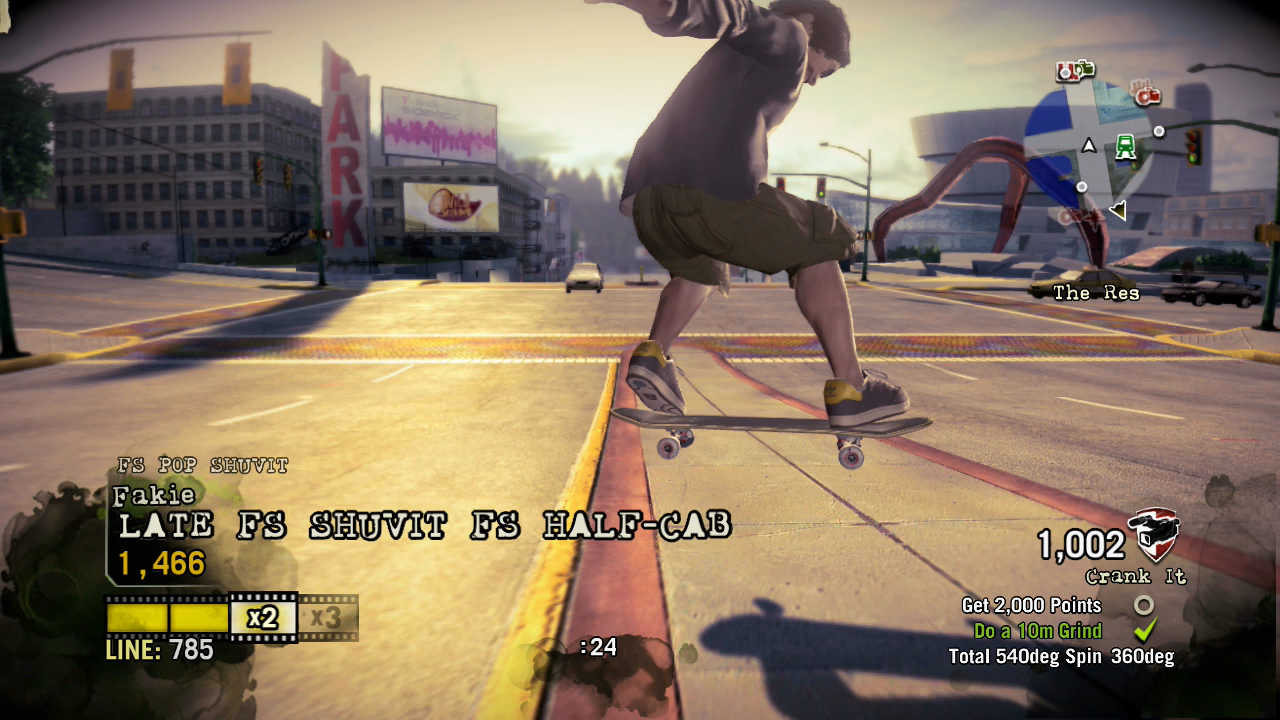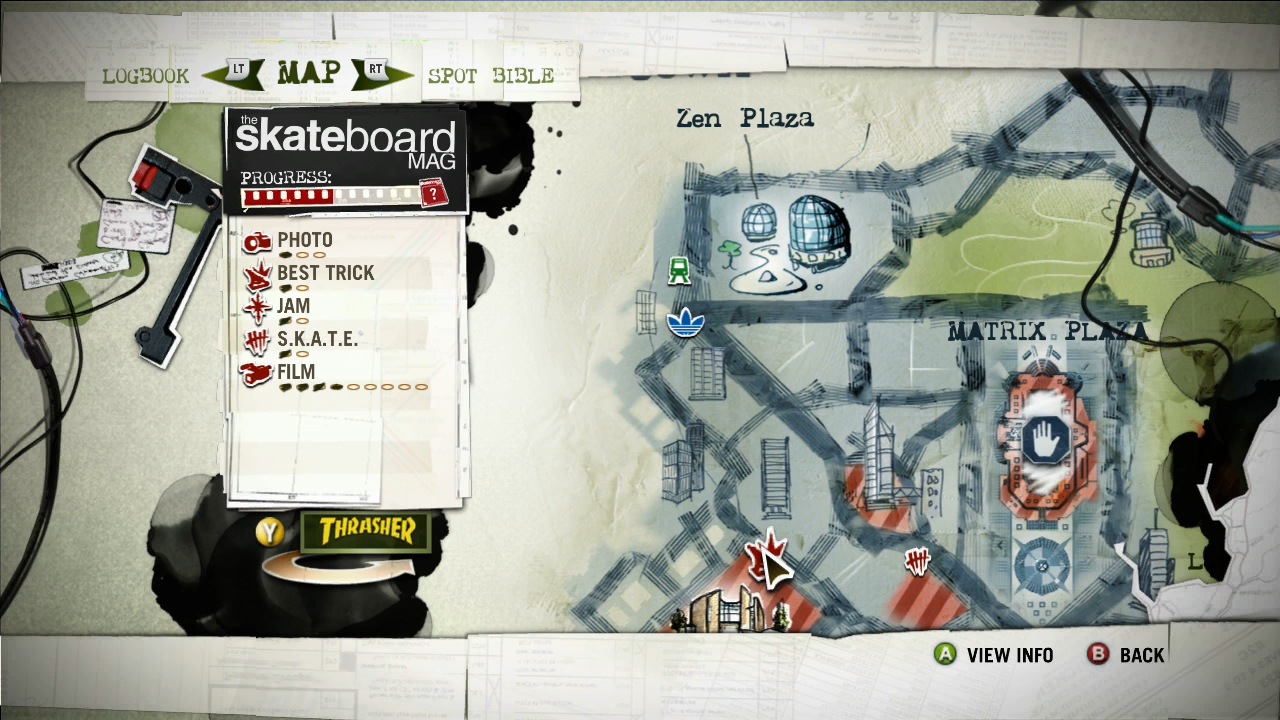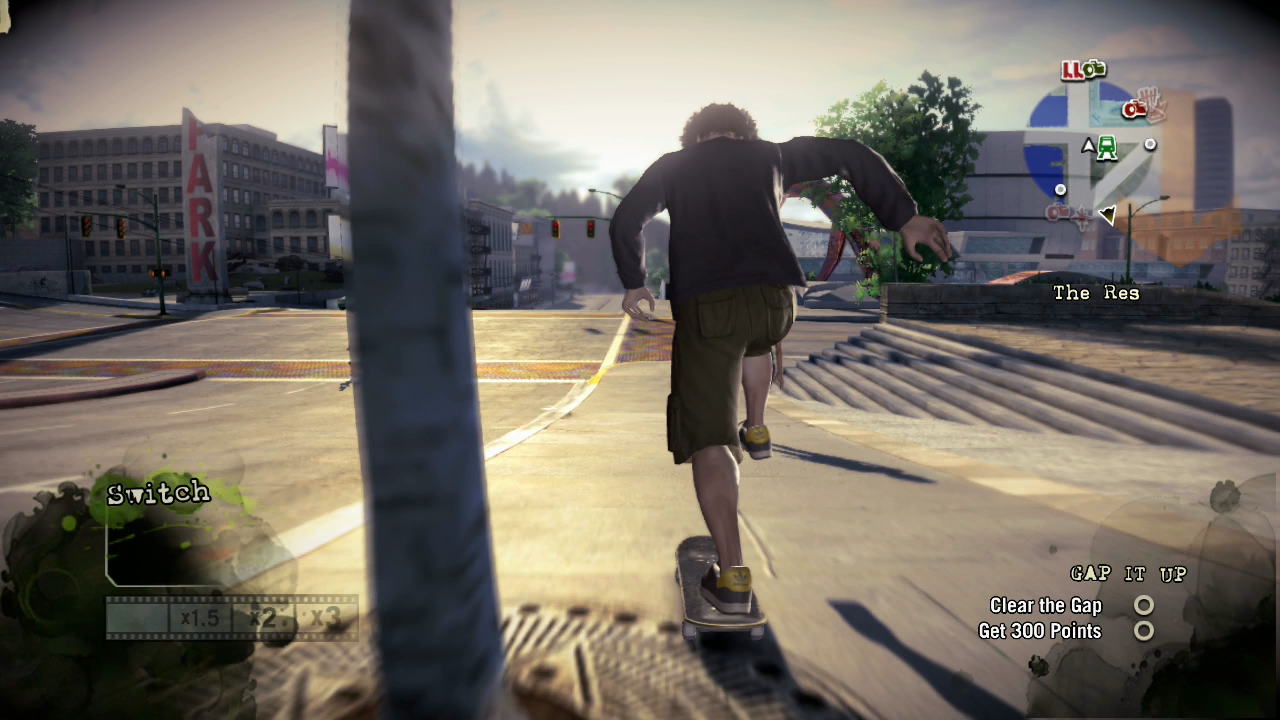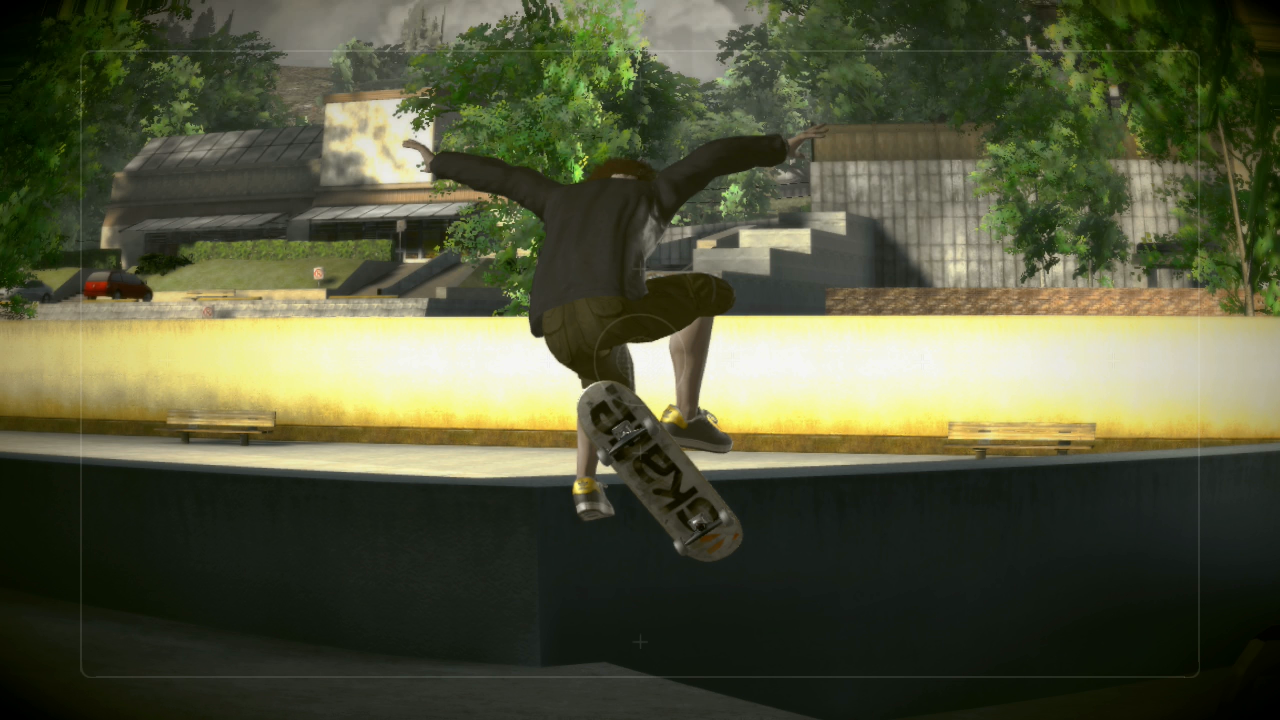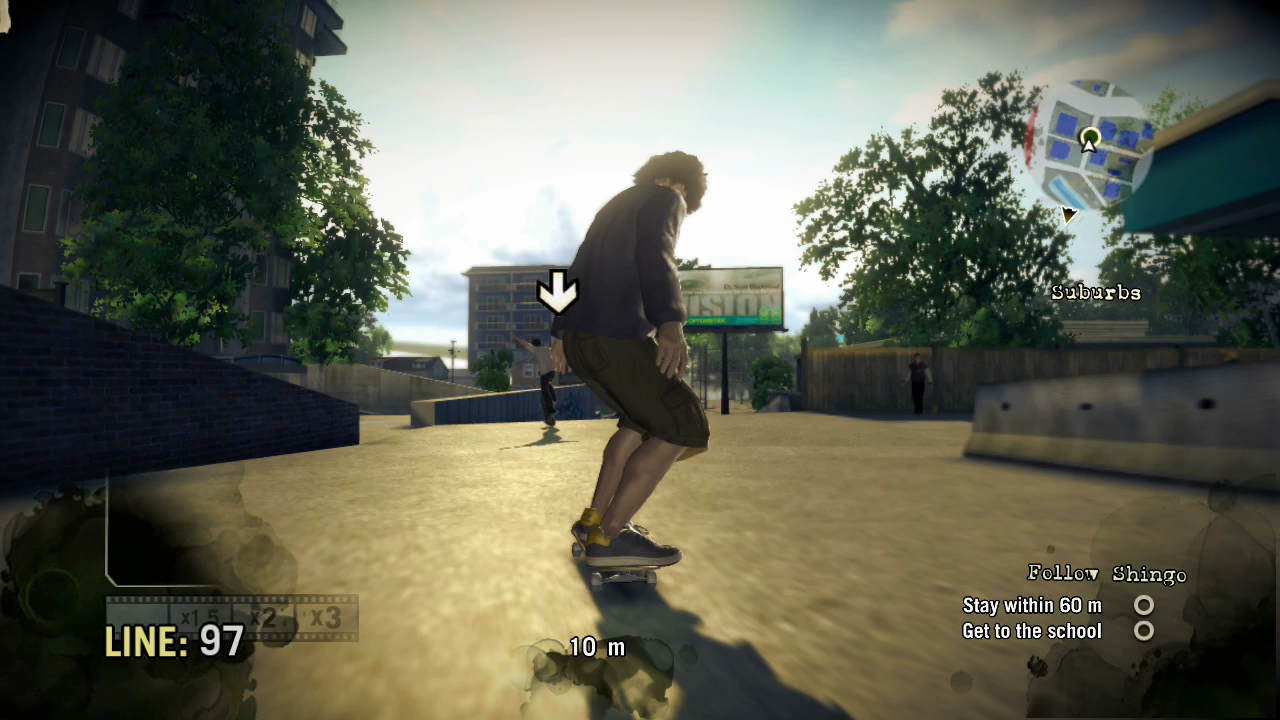SKATE (X360)
With Tony Hawk’s Pro Skater at the forefront of skateboarding games around the turn of the millennium, rivals were surprisingly thin on the ground. While some developers took a crack at dethroning the king, most didn’t come close due to the sheer popularity of the seminal early instalments. But by 2007, the peak popularity of the genre had seemingly passed and even Activision were losing the lustre of the once-headlining series. Perhaps this lull spurred on EA to take a punt with their genre debut, Skate. Boasting an innovative control scheme focused on analogue stick flicks, it would serve as a solid foundation that EA would build upon with its sequels, but it’s not a game without flaws.
Set in the fictional city of San Vanelona, you play as a rookie skater who, after being demolished by a bus and requiring extensive surgery, can be moulded to your ideal look with the custom skater creation. After the makeover, you’re tasked with building credibility through a variety of challenges, helping land a gig with Skateboarding and Thrasher magazines. There are some brief cut-scenes, which look cool with their distinct, papercraft appearance, but it’s mostly dressing for the main meat of the game: the skateboarding.
Skate's cool art style and innovative control scheme help it stand out from the Pro Skater imitators
By the time Skate launched, its genre was in need of a refresher. EA’s key innovation was the Flick-It control system. Unlike the button-bashing antics gamers were accustomed to, EA Black Box’s new system focuses on the right analogue stick, as you hold the stick down and flick up (or in reverse to do Nollie variants of tricks) with your flick direction dictating the trick. Grinds are similar, with the direction of your analogue stick push changing the grind and Grabs are mapped to the triggers. It feels really inventive, requiring considered use rather than button mashing, but it’s not faultless. It can have trouble picking up more advanced motions, which is okay in most events, but those which require specific tricks such as SKATE challenges become more frustrating as a result. That being said, there’s something satisfying about nailing a more complex trick with motions that feel close to the trick itself and aspects such as the steady physics and smooth technical performance are welcome.
While Skate benefits from solid mechanics, its modes leave a little to be desired. The Career is where players will invest the most time, with a small sandbox serving as your playground. Challenges are limited in variety, though a few are creative. Film lets you choose your spot across the map and, with three targets to meet, decide your line with a good deal of freedom. Photo Challenges are similar, but in a single, static location. Competitions force you either to score big or nail a huge trick against a group of other skaters. Pro Challenges teach you mechanics and tricks, while SKATE is like a game of Horse, as you either copy or set unique tricks. It’s a solid yet unremarkable set of tasks, with Spots being the only incentive to explore San Vanelona. While the grounded approach is welcome, the variety of challenges doesn’t keep the momentum.
While Skate benefits from solid mechanics, its modes leave a little to be desired. The Career is where players will invest the most time, with a small sandbox serving as your playground. Challenges are limited in variety, though a few are creative. Film lets you choose your spot across the map and, with three targets to meet, decide your line with a good deal of freedom. Photo Challenges are similar, but in a single, static location. Competitions force you either to score big or nail a huge trick against a group of other skaters. Pro Challenges teach you mechanics and tricks, while SKATE is like a game of Horse, as you either copy or set unique tricks. It’s a solid yet unremarkable set of tasks, with Spots being the only incentive to explore San Vanelona. While the grounded approach is welcome, the variety of challenges doesn’t keep the momentum.
Outside of Career, local multiplayer extends the package. There was online multiplayer too, but sadly this was shuttered in 2011, including the valuable sharing features that allowed players to share epic moments – though you can still save these to your Hard Drive. These modes are all single-controller, as you can take turns in SKATE and Spot Challenge with unique skaters, locations and extras unlocked by playing through the main game. Sadly, there are no split-screen offerings, meaning experiencing multiple players in a single skate park is no longer possible. That being said, Skate’s single-player options will likely last close to 20 hours, so it’s still a beefy package.
Skate’s presentation is both eye-catching and technically accomplished. The cut-out art style in the menus and certain cut-scenes fits really well, different lighting hues highlight each part of the city such as Downtown’s dark blues created by towering skyscrapers and animations look a cut above the competition. Performance is remarkably stable, avoiding the frustrations caused by choppy frame rates. The sound also fares well, with a remarkably varied soundtrack swinging between the likes of Slayer, NWA and Band of Horses. The grisly bail sounds cause you to cringe every time, chunky skating sounds fit well and the sparingly-used voice acting is serviceable.
Skate’s presentation is both eye-catching and technically accomplished. The cut-out art style in the menus and certain cut-scenes fits really well, different lighting hues highlight each part of the city such as Downtown’s dark blues created by towering skyscrapers and animations look a cut above the competition. Performance is remarkably stable, avoiding the frustrations caused by choppy frame rates. The sound also fares well, with a remarkably varied soundtrack swinging between the likes of Slayer, NWA and Band of Horses. The grisly bail sounds cause you to cringe every time, chunky skating sounds fit well and the sparingly-used voice acting is serviceable.
It's a distinctive experience thanks to an unusual control scheme, though Skate's game modes lack depth
Skate marked a promising start, but not a top skateboarding contender. The innovative trick control system would help it stand apart from its direct competitors, but it also proves patchy at times. It feels like Black Box focused all their attention on this control scheme, as the remainder of the content doesn’t feel as fleshed out. That being said, its innovations and solid foundations come together to make for a good time and those who have exhausted the many competing skateboarders may want to dip their toes with this one.
|
|
VERDICT
"Skate marks a good start, with an innovative trick system and solid foundations. However, inconsistent responsiveness and a lack of content depth mean it isn't a top contender” OVERALL: 7/10 |
